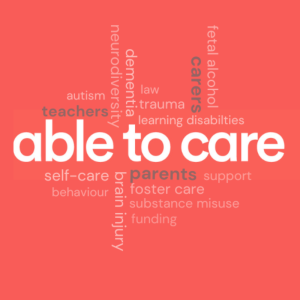
Friday May 24, 2024
What Causes Challenging Behaviour?
In this episode of the Able to Care podcast, hosted by Andy Baker, we delve into the intricate subject of challenging behavior, with a focus on aggression. Andy breaks down the causes of such behavior into three primary factors: reflex, reactive, and intentional actions. Using practical examples and analogies, he explains how innate responses, environmental stressors, and learned behaviors contribute to aggressive outbursts. Listeners will gain insights into why people react the way they do, the role of inhibitors like consequences and values, and how emotional and physical stressors can shake up our 'bottle of coke.' Andy also discusses the importance of self-regulation and the challenges some individuals face in managing their emotions. This episode is a comprehensive guide for anyone looking to understand and manage challenging behavior more effectively. Tune in to learn valuable strategies for fostering positive interactions and promoting better outcomes in both personal and professional settings.
Timestamps:
00:01:09 - Introduction to the three main factors contributing to challenging behavior: reflex, reactive, and intentional actions.
00:03:10 - Discussion on the inhibitors that hold individuals back from acting out aggressively, including fear of consequences and social norms.
00:05:34 - Insights into the importance of self-control and the challenges individuals face in regulating their emotions.
00:10:23 - Explanation of the reactive factor using the "bottle of coke" analogy to illustrate how environmental stressors can trigger aggressive behavior.
00:13:12 - Exploration of intentional behavior and the role of conditioning in shaping learned responses, using the example of lying as a defense mechanism.
Key Messages:
- Understanding Behavior: Behavior, especially challenging behavior like aggression, is influenced by three main factors: reflex, reactive responses to environmental stressors, and intentional actions shaped by conditioning and learned responses.
- Inhibitors and Regulation: Inhibitors such as fear of consequences and social norms play a crucial role in preventing individuals from acting out aggressively. However, the ability to regulate emotions and control reflexive responses varies among individuals and can be influenced by factors like past experiences and environmental stressors.
- Promoting Positive Change: To address challenging behavior effectively, it's essential to consider the underlying motivations and stressors driving the behavior. By fostering a safe environment, teaching coping strategies, and promoting positive reinforcement, individuals can learn to manage their behavior more effectively and make positive changes in their lives.
#BehaviorAnalysis #BehaviorManagement #ChallengingBehavior #TraumaInformedCare #EmotionalRegulation #YouthJustice #ReflexiveResponses #CopingStrategies #BehavioralScience #PositiveChange #SocialInhibition #EnvironmentalStressors #MentalHealthAwareness #SelfRegulation #UnderstandingBehavior #ChildDevelopment #BehavioralTherapy #YouthEmpowerment #BehaviorModification #EmpathyBuilding
No comments yet. Be the first to say something!